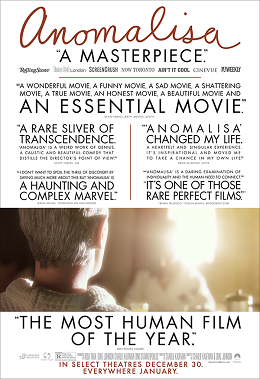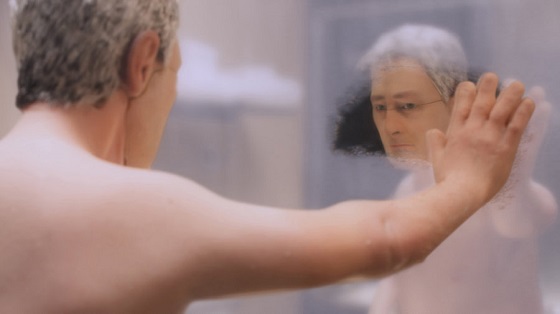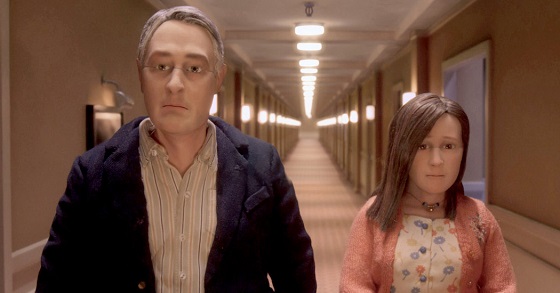[Minor Rock Fist Down]
As a cinematic recipe, Charlie Kaufman plus stop-motion puppets plus existentialist introspection should bake well, yet if Anomalisa proves anything, it’s that the aforementioned fixings don’t pair all that well. It’s not their fault, as these ingredients are of the highest quality, it’s just that they just represent half of a recipe that needs a few other key contributors to make the bake a success. In other words, Anomalisa is a cake without any sugar or frosting: it is a thing which can be consumed, yet is conspicuously lacking in several crucial areas.
The film opens on a commercial jet, with a man on it, Michael Stone (voiced by David Thewlis), reading the response to what the audience can only assume was a “Dear John” type letter. Michael lands in Cincinnati and proceeds directly to his hotel, where he is staying for an evening before his scheduled lecture at a business conference of sorts the next day. The interactions he has paint Stone in a hollow, almost empty light; Michael has trouble maintaining simple discussions, or engaging in chit-chat scenarios. It takes a few conversations to really establish it for certain, yet by the time Michael finishes a cursory call to his wife and child back home, it’s clear that all the characters, save Michael, are variations of the same voice (indeed, imdb lists Tom Noonan as the voice of nearly every other character, male and female).
This set-up, and the central conceit of Anomalisa (a man trapped in a world populated by personality clones), is enough to spark a bit of interest in the picture, yet as events unfold, it becomes clear that it is all just a house of cards. Impressive from a distance, if only conceptually, there’s just not a lot anchoring the film to anything more substantial than a story about a man in the midst of a fairly generic mid-life crisis. Granted, the stop-motion animation is exceptional, and the conversations feel organic and natural, it’s just that none of this coalesces to take the audience on much of a journey.
It all seems to build towards the moment when Michael hears a new voice, one that doesn’t share the same cadence and tone as every other in his world. A young woman named Lisa (voiced by Jennifer Jason Leigh) is staying at Michael’s hotel, and he’s immediately drawn to her. As the two get to know each other, and Michael becomes increasingly enraptured by the younger, more insecure Lisa, Anomalisa flirts with some level of growth on a narrative level. To say much more about the events that unfold would put this review into spoiler territory, yet it should be enough to state that things don’t develop in any way that would elevate the character and narrative arcs beyond what one might find in an amateur film school offering.
Anomalisa was written and co-directed by Charlie Kaufman, the man that gave birth to inventive and entirely outside-the-box offerings like Being John Malkovich and Adaptation. Original, unpredictable, and frighteningly introspective: all are attributes people have come to expect from the maverick auteur, and yet none of these things apply to Anomalisa. What was it about Michael’s life and his decisions that brought him to a point where the world turned into a cookie-cutter forest of repeating faces and voices? What can we, the audience, learn from his story, and what, if anything, has Michael learned as a result of his encounter with Lisa? The movie doesn’t offer much in the way of answers on any of these fronts, yet even more distressing is the fact that Anomalisa doesn’t seem all that interested in asking that many questions, either.
A middle-aged guy on a business trip is in a rut, and in his blind groping around for answers, he discovers some sliver of hope in a fresh-faced, if somewhat naïve, young woman who makes him feel alive again. Sure, that’s a decent enough first act set-up, and with the stop-motion puppetry added in and the voice-work angle, there’s a creative flair added into things, yet that’s about it. Kaufman doesn’t do anything especially novel with the story from here, and the characters (not to mention the audience) don’t really get much out of the whole experience. Again, going back to the cake analogy, there’s a foundation here for something interesting, like a bourbon bundt, or something; yet despite a little whiskey flavor in the sponge, the base isn’t fresh, the topping tastes store-bought, and the presentation is dismal. Can you eat it? Yes. Does it represent anything special, novel, or unique; does it add anything to the world of cakes or desserts in general? No.
Were it anyone else but Charlie Kaufman holding the reins on this, things might not seem so generic and adrift, yet again, considering the level of novelty and creativity he has brought to previous offerings, Anomalisa feels decidedly thin, and only partially formed. Graphic puppet sex and an interesting concept save this one from total futility, and with a running time just under 90 minutes, the effort is breezy, brisk, and not too terribly taxing. Yet considering the talent involved, and the fantastic work put in by the animators, it is hard not to feel a bit let down at what might have been.








Comments on this entry are closed.